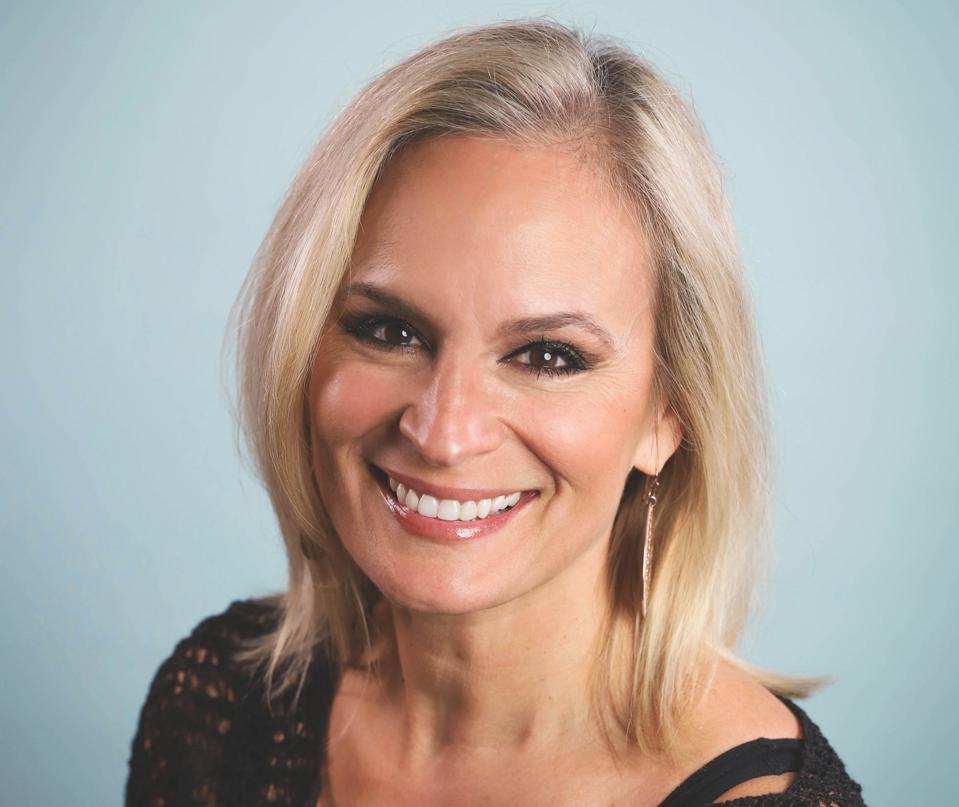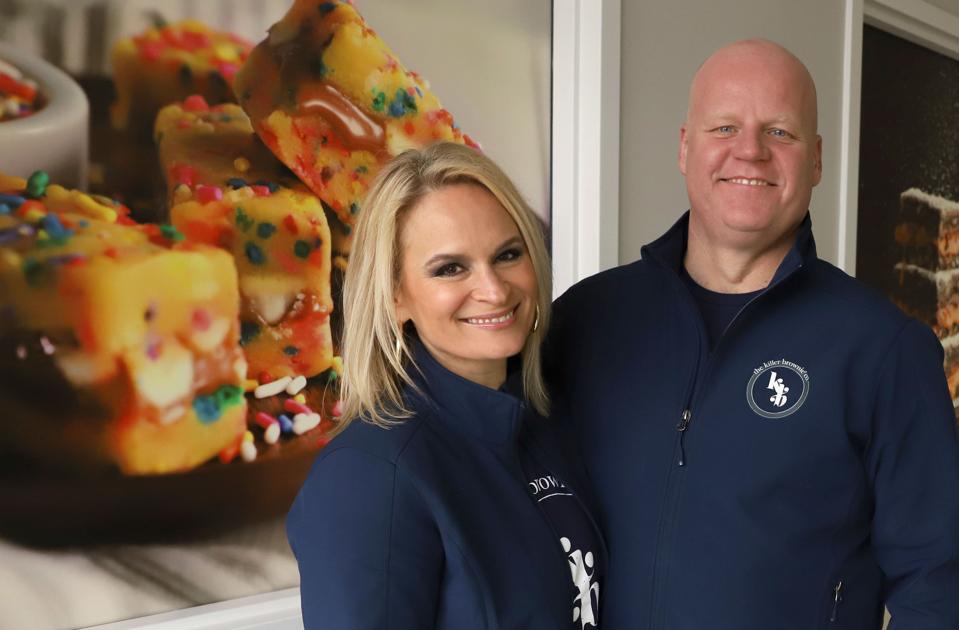The buzz was inescapable, as soon as the Mayne family introduced their new brownie at their grocery store, Dorothy Lane Market, in the late 1980s. The product, a decadent delight with a unique flavor profile, moist consistency, and indulgent size, took no time in becoming a cult favorite in the market’s hometown of Dayton, Ohio, helped along by a catchy name, The Killer Brownie, which Norman Mayne, Dorothy Lane Market’s CEO, soon went on to trademark.

You could eat them with a fork, but the Killer Brownie probably won’t wait for you to find one.
Beyond what other people thought about it, says Mayne’s daughter, Chimene Mayne Ross, “we couldn’t escape the evidence of our own taste buds; it was obvious with every bite that we had a winner here that deserved a spotlight all its own.” Ultimately, Ross herself would come aboard to give the Killer Brownie the attention it deserved, helming a brownie-centric effort that, as of press time today, finds it available in 1500 in-store bakeries and food service operations coast to coast. Since 2013, when Ross came onboard, The Killer Brownie Co. (now a separate entity, though still owned by the Mayne family) has grown 500%; last year alone, sales have doubled. All numbers are self-reported.
Micah Solomon, Senior Contributor, Forbes.com: You come from the family that owns Dorothy Lane Market, which is a Dayton, Ohio institution.
Chimene Ross, President and Chief Customer Officer, The Killer Brownie Company: That’s right. My grandfather opened a grocery store in 1948 when the concept of supermarkets was relatively new. Dorothy Lane Market is now in its fourth generation and still family owned, with three locations plus a central baking facility. It’s locally beloved and nationally known to some extent as well. Food & Wine, in fact, just listed it as #2 on their list of the 20 Best Regional Supermarkets, even ranking it above industry legends like the Northeast’s Stew Leonard’s.

Chimene Ross, President and CCO at The Killer Brownie® Company
Solomon: I’d love to hear about the Killer Brownie graduating from your grocery’s baking operation and becoming a standalone brand.
Ross: Although my dad did wholesale our brownies to his friends in the grocery business around the country, it was still best known in Dayton, and only as a signature product for Dorothy Lane Market. Then, in 2013, I left my nursing career to join the family business and focus on sales and growth for the brownie. In 2017 we received the globally recognized GFSI (global food safety initiative) SQF (Safe Quality Food) certification, which allowed us to expand the reach of our sales potential through brokers in other markets around the country. To facilitate this, we started to recruit and build a team of talented people, including a food safety manager, food scientist, plant director, buyer and warehouse manager. These were the people who could help us build the processes and products to grow our unique brand.
One of these essential hires was my husband, Matt Ross, who joined the company that year as Production Manager. [He’s now VP of Operations.] With Matt’s background in process and project management, he was able to help us figure out, step by step, what we needed to implement to increase our capacity.
Solomon: Is the original chocolate-centric brownie recipe still the star of the show?
Ross: Today the lineup has grown to a dozen flavor varieties, including such flavors as cookie dough, confetti, salted caramel, raspberry, German chocolate and a few extra-decadent specialty flavors. These specialty brownies have up to five layers, including cookies and cream made with real Oreo cookies and, coming this summer, pumpkin. (Yes, we’re beating Starbucks to the pumpkin punch by a couple months!) All have the same moist consistency that our proprietary recipes and unique manufacturing process have allowed us to maintain and scale.
Solomon: During the COVID disruption, have you pivoted more than you planned to direct sales via eCommerce?
Ross: The online business-to-consumer business is up 40% since COVID hit. To some extent this is an offshoot of our marketing efforts: Even though we are primarily a B2B business (selling to retailers, in-store bakeries and foodservice chains that in turn serve the general public), we take our B2C marketing very seriously. This marketing both directly supports online sales and supports our business customers in the image that’s projected to their customers. Thanks to the efforts of our marketing director, we’ve grown to have an Instagram following of over 20,000, and have been featured by companies like Delish on Facebook. We are also a featured brand on Goldbelly.com. While our very serious focus during COVID has been on ensuring the safety of our employees, I think we’ve also found joy in the pleasure we’re bringing to people out there during lockdown.
Solomon: Speaking of pleasure, and possibly pain, what’s it like working together with your husband?

Chimene Ross, President and Chief Customer Officer and Matt Ross, VP of Operations, The Killer … [+]
C. Ross: It’s a lot of fun! It certainly helps that my husband is a rock and is brilliant at operations, at keeping us smart, efficient and running. The hardest part is not taking business home at night.
Matt Ross, VP of Operations, The Killer Browning Company: Working in the same business is like sharing the raising of children. If you have a good relationship, the inevitable issues involved in raising kids will make your relationship stronger; if you have a bad relationship, it will make it worse. (Our relationship, to be clear, is one of the ones that has been made better!) I agree with Chimene that, for us, the problem is finding the boundaries and not talking about brownies from the time we wake up ‘til the time we go to sleep.
Solomon: Can the two of you share some tips for other entrepreneurs and business leaders?
C. Ross: Here are a few:
• As an entrepreneur, don’t get stuck in the highs or the lows. Neither of them last too long. Be consistent; strive to stay on an even keel while you enjoy the good and learn from the down times.
• Invest in marketing and use it to tell your story.
• Protect your bottom line: don’t give away your business. Your profits are what allow you to provide great product, service and a great work environment.
• Invest in your people. I mean this both in terms of taking an interest in their advancement and in terms of money. Along these lines, my dad and brother established a profit sharing program years ago for all full-time employees, and we carry that on to this day.
• M. Ross: Purpose, vision, mission: These are critical for every business. I didn’t appreciate this early in my career; I thought of them as just fluffy marketing pieces that executives came up with during a retreat at a golf resort, sentiments that they then put in a drawer so they could continue to just look at the numbers when the time came to make decisions. The reality is, when used correctly and intentionally, a meaningful purpose, vision, and mission should guide every business decision and attract the necessary people to your team. Ours, by the way, are:
Vision: To be recognized as the Brownie Specialists
…via our Mission: We craft the world’s most delightful brownie experiences
…so that we can live our Purpose: To nurture an environment that allows all of us to reach our fullest potential.

No Comments
Leave a comment Cancel